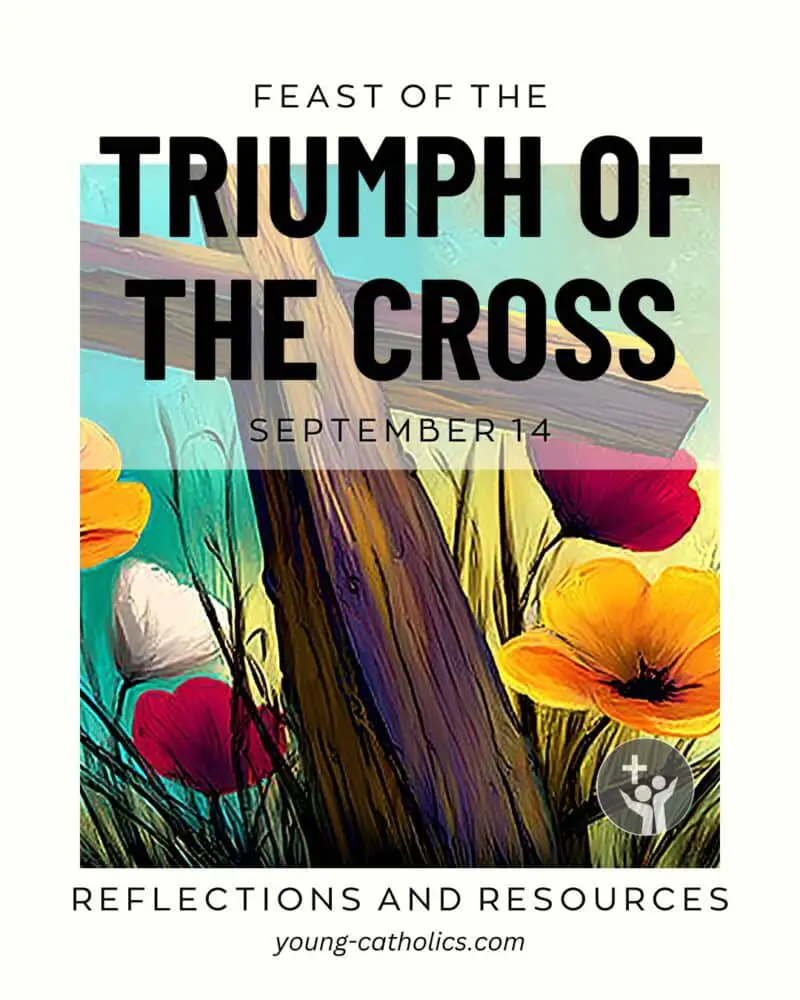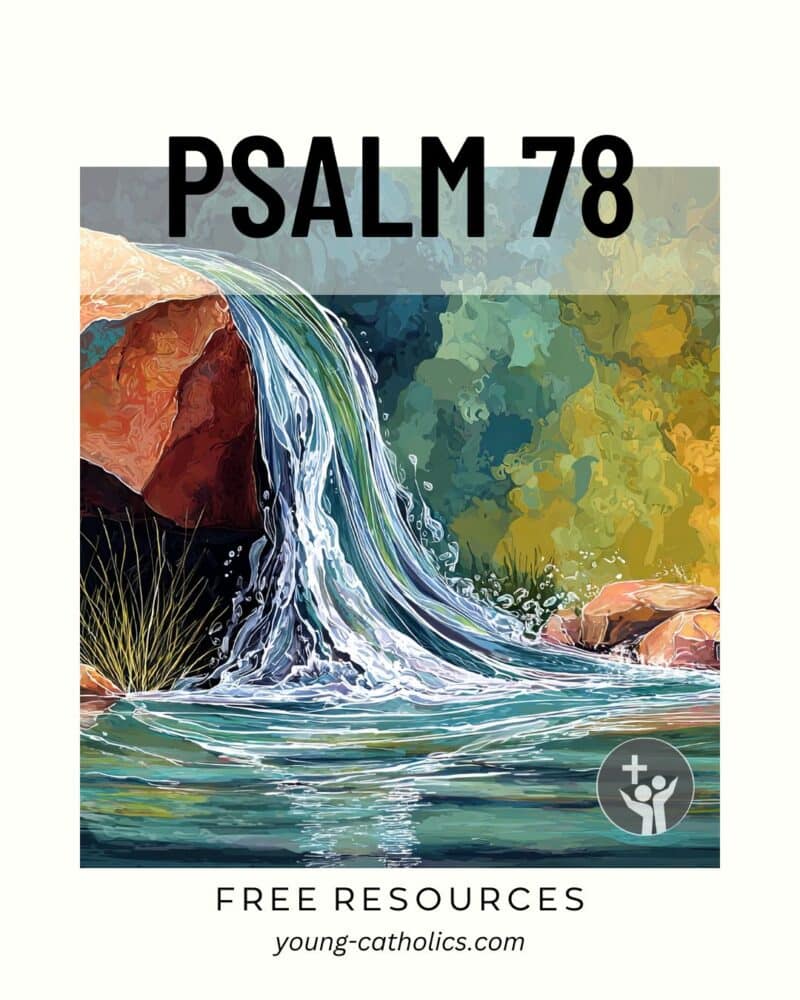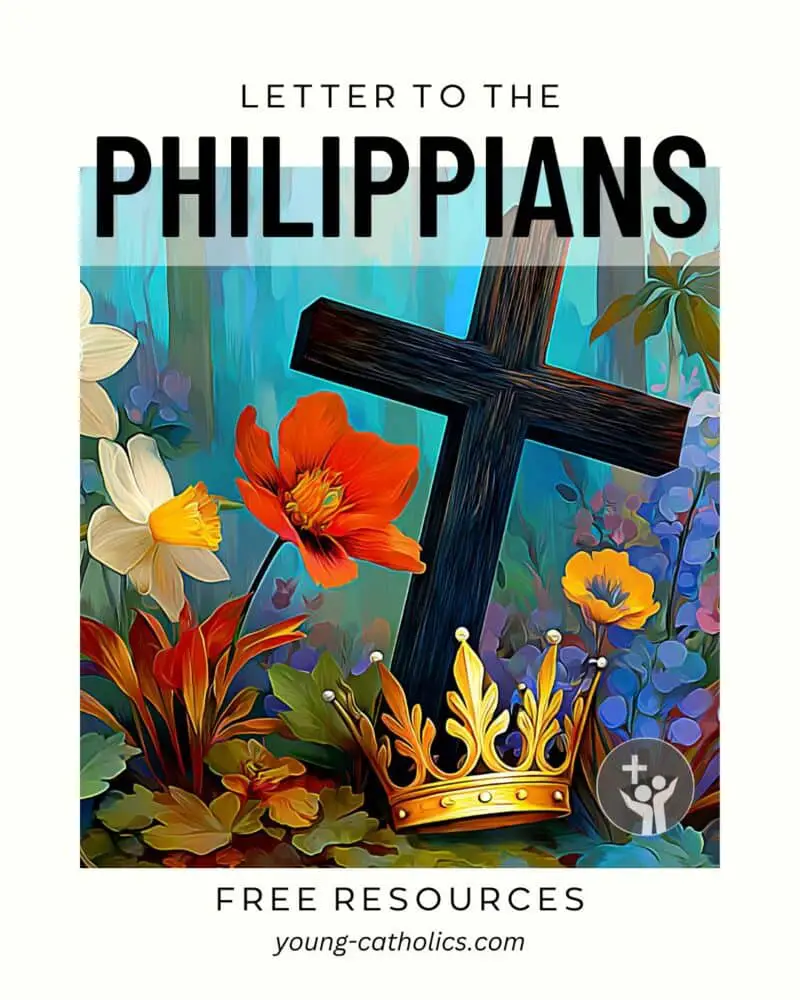Exaltation of the Holy Cross
September 14

The Feast of the Exaltation of the Holy Cross remembers the Cross of Jesus. It has been celebrated by the Church for centuries. The feast began in the 4th century, when the True Cross was found by St. Helena, the mother of Emperor Constantine. Tradition says she found the Cross in Jerusalem, where Jesus was crucified. This discovery made a deep impression on Christians and led to honoring the Cross in a special way.
The feast celebrates the Cross because it is the symbol of our faith. The Cross shows us how much Jesus loves us. He died on the Cross to save us from our sins. In Christian tradition, the Cross is a sign of hope, even though it was an instrument of death. It reminds us that Jesus turned suffering and death into victory and life.
We celebrate this feast on September 14. On this day in the year 335, the Church in Jerusalem dedicated a new church built on the site where Jesus died and rose from the dead. The church was built to honor both His crucifixion and His resurrection. Every year since then, the Church remembers this day and the power of the Cross.
The Feast of the Exaltation of the Holy Cross is a time to reflect on what the Cross means to us. It is more than a symbol. It is a reminder of God’s love and mercy. By celebrating this feast, we honor the victory Jesus won for us through His death and resurrection.
St. Helena and the Discovery of the True Cross
St. Helena, the mother of Emperor Constantine, played a key role in finding the True Cross. She became a Christian later in life and had a deep devotion to Jesus. In the year 326, she went on a pilgrimage to the Holy Land. She wanted to find the places where Jesus lived, died, and rose from the dead. Her greatest goal was to find the Cross on which Jesus was crucified.
During her journey, she asked the people of Jerusalem for help. Tradition says that after much searching, she discovered three crosses buried near the site of Jesus’ crucifixion. She believed one of these was the True Cross. To know which cross belonged to Jesus, they touched a sick woman with each one. When the woman was healed after touching one of the crosses, they knew it was the Cross of Christ.
The discovery of the True Cross was a moment of great joy for Christians. St. Helena made sure the Cross was treated with great respect. Part of it was kept in Jerusalem, while other parts were sent to churches throughout the Roman Empire. This allowed many Christians to venerate the True Cross.
The True Cross became a central symbol in the Church. It reminded Christians of the sacrifice Jesus made for them. St. Helena’s discovery strengthened the faith of many believers. The Cross has been honored ever since as a sign of victory over sin and death.
The Cross: A Sign of God’s Love
The Cross is a symbol of Christ’s sacrifice and our redemption. Jesus willingly died on the Cross to save us from our sins. He took on the suffering we deserved and offered His life for us. Through His death, He opened the way to eternal life. The Cross reminds us of this great act of love and mercy.
The Cross also represents forgiveness. Jesus forgave those who crucified Him, saying, “Father, forgive them, for they know not what they do” (Luke 23:34). His death was an act of forgiveness for the whole world. When we look at the Cross, we see how much God is willing to forgive us, no matter what we have done.
The Cross gives us hope. Even though it was a tool of suffering and death, Jesus turned it into a sign of victory. His resurrection shows that death is not the end. By carrying our own crosses, we are united with Jesus and can share in His victory. The Cross tells us that no matter how hard our struggles are, there is always hope in Christ.
Catholics venerate the Cross in daily life and in liturgy. We make the Sign of the Cross when we pray. We display crosses in our homes and churches. During Mass, the priest raises the Cross, reminding us of Christ’s sacrifice. The Cross is a central part of our faith, and through it, we remember God’s love and the promise of eternal life.
How We Celebrate the Feast of the Exaltation of the Holy Cross
The Feast of the Exaltation of the Holy Cross is celebrated with special readings, prayers, and hymns during Mass. The Gospel reading is from John 3:13-17, where Jesus speaks about being lifted up on the Cross, just like the bronze serpent in the desert. This reminds us that Jesus was lifted up to save us. The first reading often comes from the Book of Numbers, telling the story of Moses lifting the bronze serpent to heal the people. These readings help us reflect on the meaning of the Cross in our lives.
The prayers during the Mass for the Exaltation of the Holy Cross focus on God’s love and mercy shown through Jesus’ sacrifice. We give thanks for the salvation won for us through the Cross. The hymns also reflect the triumph of the Cross. Songs like “Lift High the Cross” celebrate the victory of Christ’s death and resurrection. Through these prayers and hymns, we remember that the Cross is not a sign of defeat, but of victory and hope.
This feast is celebrated around the world. In Jerusalem, where the True Cross was found, the Exaltation of the Holy Cross is celebrated with great solemnity. In Rome and other parts of the world, churches hold special Masses and processions. Catholics come together to honor the Cross, and many venerate a relic of the True Cross if one is available. The global celebration reminds us that the Cross unites all Christians in faith.
During the liturgy, the Exaltation of the Holy Cross invites us to reflect deeply on the meaning of the Cross. The Cross is not just a historical event, but a living symbol of God’s love for us. As we pray and sing, we are called to embrace the Cross in our own lives, trusting in the power of Christ’s sacrifice. The liturgy helps us see the Cross not as a burden, but as the path to eternal life.
Living the Cross Every Day
The Exaltation of the Holy Cross teaches us how to live the message of the Cross daily. One way to do this is by embracing the little sacrifices and difficulties we face. When we have problems, we can unite our struggles with Jesus’ suffering on the Cross. This helps us see our hardships in a new light. It becomes a way to grow closer to Christ and share in His love.
Another way to live the spirituality of the Cross is by offering up our suffering in union with Christ’s Passion. We can offer our pain, sadness, or challenges for the good of others or for our own conversion. This is a powerful way to bring grace into our lives and the lives of others. The Cross reminds us that suffering can have meaning when united with Christ’s sacrifice.
The Exaltation of the Holy Cross also calls us to trust in the power of the Cross. It is easy to feel discouraged when we face difficulties. But the Cross shows us that God can bring good out of any situation. We can trust that the Cross has the power to change us and help us grow in faith. In times of doubt or weakness, we can turn to the Cross for strength.
Finally, the Exaltation of the Holy Cross reminds us that the Cross is a path to conversion. It is not just about suffering but about transformation. By embracing the Cross, we are changed and made new in Christ. Each day, we are called to follow Jesus, carry our own crosses, and trust in the victory He won through His death and resurrection.
Daily Mass Readings for the Feast of the Exaltation of the Holy Cross
- First Reading – Numbers 21-4b-9: Tired of their journey and food, the people complain against God and Moses. In response, God allows venomous serpents. After repenting, the people are told by God through Moses to look at a bronze serpent for healing.
- Responsorial Psalm – Psalm 78: Hear, my people, how even when you turned from me, I, in my mercy, forgave you and restrained my wrath. Do not forget the works of your merciful God.
- Second Reading – Philippians 2:6-11: Though in the form of God, Jesus didn’t strive for equality with God. He humbled himself, obeying even unto death on a cross. For this, God exalted him above all names.
- Gospel – John 3:13-17: Jesus tells Nicodemus that only he, the Son of Man, descended from and will ascend to heaven. Like Moses’ serpent, he must be lifted up for people to gain eternal life. God sent him not to condemn, but to save.
Social Media Graphics and Bulletin Artwork for the Feast of the Exaltation of the Holy Cross
New Life at the Foot of the Cross

Celebrate the Triumph of the Cross with this beautiful image, reminding us that life and hope bloom through Christ’s sacrifice. Perfect for parish bulletins, newsletters, or faith-sharing materials, it offers a visual reminder of God’s love.
Download it today and share the message of the cross with your community.
Paid subscribers may download a large copy this digital artwork without watermarks, suitable for use in bulletins, social media, newsletters, etc., free of charge by clicking here. You must be logged in as a paid subscriber to access the file.
Only current paid subscribers have the rights to use the artwork.

Everything is a reminder of the Cross. We ourselves are made in the shape of a cross.
St. John Vianney
Homilies and Reflections
- Words Fail (Fr. Mike Schmitz)
- Christ, and Him Crucified (Bishop Robert Barron)
- A Deeper and Wider Love (Order of Preachers)
- The Most Famous Bible Verse (Dynamic Catholic)
- Change for the Good (Order of Preachers)
- Finding Hope in the Cross (USCCB)
- Jesus’ Mission of Love (Word on Fire)
- A Symbol of Suffering and Redemption (USCCB)
Words Fail
Words help, but symbols often speak with clarity. Scripture shows this when a sign points beyond language, like the bronze serpent lifted for healing. Fr. Mike Schmitz explains that God turns the sign of shame into a symbol of hope in the cross.
The cross was a tool of terror, yet God used it to answer our guilt and our doubts. When we put God on trial, His reply is still the cross. Jesus suffered as personally as if only one person needed saving. On the Feast of the Triumph of the Cross, we are invited to look at Him, trust His love, and let that sign become our hope.
Christ, and Him Crucified
The cross was once a tool of terror in the Roman world, a symbol of control and humiliation. To exalt it would have seemed absurd. Yet Christians did not hide the way Jesus died. They proclaimed him as Lord, even though crucifixion was meant to show defeat. The only way to explain this is the resurrection, which revealed that God had turned this symbol of shame into a sign of victory.
This message is shared by Bishop Barron, who reflects on how the cross shows God entering fully into human cruelty and sin. Instead of grasping at power, Jesus emptied himself, even to death on a cross. By doing this, he remade our brokenness from within. What looked like defeat became salvation. This is why we celebrate the Feast of the Triumph of the Cross, and why the cross, once feared, is now honored as the greatest sign of God’s love.
A Deeper and Wider Love
Sr. Elyse Ramirez reflects on how the cross is seen everywhere, from jewelry to tattoos, yet it must not lose its meaning. For her, the cross is not about condemnation but about God’s endless covenant of love. She explains that Jesus met people like Nicodemus with patience and compassion, not judgment. The cross shows us that God’s love is stronger than fear, sin, or even death, and it invites us to step out of our own wilderness of doubts and idols.
In her message for the Feast of the Triumph of the Cross, Sr. Elyse Ramirez calls us to live with a deeper and wider love. Jesus reached out to outcasts, sinners, and all creation, showing that God’s love is for everyone and everything. As disciples, we are invited to do the same, letting God’s mercy and justice flow through our lives so that the cross becomes a sign of hope and life for the world.
The Most Famous Bible Verse
In this reflection for the Feast of the Exaltation of the Holy Cross, Matthew Kelly explores Jesus’ conversation with Nicodemus from John 3:13-17, focusing on the promise of eternal life. Jesus prophesies His death, comparing His being “lifted up” to Moses lifting the serpent in the wilderness.
Kelly highlights the famous verse John 3:16, reminding us of God’s love and promise of eternal life through belief in His Son. He encourages us to take time to reflect on heaven, eternity, and God’s promises, making them a guiding light in our lives. This reflection calls us to rest in the hope of eternal life.
Change for the Good
In this reflection for the Exaltation of the Holy Cross, Sr. Barbara Kane shares a story from her chaplaincy training, reflecting on a family transformed by the joy and love of their disabled daughter. She connects this to the impact of Jesus’ crucifixion. Though Jesus appeared to be a failure in the eyes of society, His followers were deeply changed by knowing Him. Just as the family grew through their daughter’s unconditional love, we too are transformed by Christ’s love on the cross. Our lives, like His, should leave a lasting mark on others for the better.
Finding Hope in the Cross
In this USCCB video reflection for the Exaltation of the Holy Cross, Fr. John McKenzie shares the history of this feast, including the rediscovery of the True Cross by Emperor Heraclius in 629. He connects this to our spiritual lives, reminding us that, like Jesus, we all bear crosses.
Fr. McKenzie emphasizes that by uniting our sufferings with Christ’s cross, we find hope, resurrection, and new life. Our crosses are not just burdens, but opportunities to share in Christ’s redemptive work. He encourages us to reflect on our own crosses and unite them with Jesus, bringing peace and hope.
Jesus’ Mission of Love
In this reflection for the Feast of the Exaltation of the Holy Cross, Bishop Robert Barron focuses on Jesus’ conversation with Nicodemus, emphasizing that Jesus came into the world not to condemn, but to save. The reason for Jesus’ arrival isn’t rooted in anger or need; it’s an act of love aimed at human flourishing and restoring justice.
Bishop Barron outlines that Jesus is the culmination of God’s intent to bring divine life into even the darkest corners of human existence. He stresses that the Father sent the Son not just into human history but also into human sin and dysfunction, reaching all the way to the depths of human despair.
A Symbol of Suffering and Redemption
This video reflection for the Feast of the Exaltation of the Holy Cross highlights the centrality of the cross in Christianity, representing Jesus’ sacrificial death out of love for humanity. It acknowledges that the cross is a symbol of suffering, rejection, humiliation, and shame.
However, it emphasizes that the Church exalts the cross because it signifies redemption and God’s unending love. Just as Jesus’ perfect offering passed through suffering, our lives as disciples follow a similar pattern. When we endure suffering, rejection, or humiliation, Jesus draws near to us, and God’s love is poured out in our human weakness. The reflection celebrates the cross as a testament to God’s mercy and love.
More Resources

What Is My Cross? Lesson Plan on Dying to Self
The Feast of the Exaltation of the Holy Cross reminds us that the Cross is not just about suffering but also about hope. Jesus took up His Cross to save us, and we are called to carry our own crosses in life. These can be struggles, challenges, or sacrifices. When we accept them with faith, we grow closer to Jesus. The Cross teaches us that even in hard times, God is with us.
The lesson is that our crosses have meaning. Just as Jesus’ suffering led to victory, our struggles can help us grow in faith and love. The readings for this feast show that Jesus was lifted up to bring us life.
When we face difficulties, we can look to the Cross and remember that we are never alone. By carrying our crosses with trust in God, we follow Jesus and find strength in Him.

What Is the Paschal Mystery?
The Paschal Mystery is about Jesus’ suffering, death, and resurrection. It shows us that suffering is not the end. Jesus died on the Cross but then rose to new life. This is the same message we celebrate on the Feast of the Exaltation of the Holy Cross. The Cross was a sign of pain, but Jesus turned it into a sign of hope.
This feast reminds us that we share in the Paschal Mystery. We all face struggles, but when we trust in Jesus, we find new life. The readings for this feast show that Jesus was lifted up to save us. When we carry our own crosses with faith, we take part in His victory. The Cross teaches us that no matter how hard life gets, God is always with us, leading us to something greater.

The Book of Numbers: Healing Through Trust
The book of Numbers tells the story of Israel’s journey through the wilderness. It shows the tension between God’s faithfulness and the people’s constant doubt. This passage reminds us how easily they turned to complaints when life grew hard. Their grumbling reflects a larger theme in Numbers: trust in God’s guidance even when the journey feels endless.
When the people repent, God provides healing through the bronze serpent. Looking at it required faith and obedience, which are central to the message of Numbers. God stays faithful, even when his people fail. On the Exaltation of the Holy Cross, we remember how Christ’s cross is the true sign of healing for all who look to him in faith.

Psalm 78: Remembering God’s Mercy
Psalm 78 tells the story of Israel’s history as a lesson for future generations. It shows how God’s people often turned away, yet God stayed merciful. This psalm reminds us to remember his past works so we can stay faithful. Forgetting leads to sin, but recalling his deeds strengthens trust.
The psalm shows God’s patience and desire to teach his people, even after rebellion. This fits the Exaltation of the Holy Cross, where we see the ultimate act of mercy. God did not give up on humanity but offered salvation through Christ. His mercy calls us to repentance and gratitude.

The Letter to the Philippians: Christ’s Humble Victory
The letter to the Philippians often speaks of joy in suffering and unity in Christ. This hymn about Jesus shows that true greatness is found in humility. Paul wants the community to imitate Christ by choosing service over pride, a key theme throughout the letter.
Christ’s obedience to death on a cross reveals the path to exaltation. His humility leads to glory, and his sacrifice brings salvation. On the Exaltation of the Holy Cross, we celebrate this mystery. The cross, once a sign of shame, becomes the sign of victory for all who follow Christ’s example.

The Gospel of John: Lifted for Our Salvation
The Gospel of John focuses on Jesus as the one sent from the Father to bring eternal life. This passage links Jesus to the bronze serpent, showing that salvation comes through belief in him. Faith is a major theme in John, where signs point to who Jesus is, and believing leads to life.
God’s love is the heart of this message. Jesus was sent not to condemn but to save. On the Exaltation of the Holy Cross, we look at Christ lifted up, just as Israel looked at the serpent. His cross is the sign of God’s love, calling us to trust and receive life.
Frequently Asked Questions
What date is the Feast of the Exaltation of the Holy Cross?
It is observed annually on September 14.
It honors the discovery of what’s believed to be the True Cross by Saint Helena, and also serves as a day to venerate the cross as a symbol of Christ’s sacrifice for mankind.
What is the significance of the Feast of the Exaltation of the Holy Cross?
This day celebrates the cross as a sign of Christ’s victory over sin and death for us. The Feast of the Exaltation of the Holy Cross is also called the Feast of the Triumph of the Cross. The cross is not a sign of defeat, but a sign of redemption.
Why is the Feast of the Exaltation of the Holy Cross important in the Catholic Church?
This feast emphasizes the importance of the cross in Christian faith. It’s not just an object, but a representation of the sacrifice of Jesus, which is central to the beliefs and practices of the Church.
How is the Feast of the Exaltation of the Holy Cross celebrated?
The day usually involves special liturgical services, including mass and the veneration of the cross. Hymns focused on the cross, such as “Lift High the Cross,” are typically sung. Churches may also hold processions or other special events.
Is the Feast of the Exaltation of the Holy Cross celebrated in all Christian denominations?
While it’s most closely associated with the Catholic Church, the Feast of the Exaltation of the Holy Cross is also observed by some other Christian denominations, including the Anglican and Eastern Orthodox Churches.
Are there specific prayers or rituals for the Feast of the Exaltation of the Holy Cross?
Many churches have a special liturgy that includes the veneration of the cross. Some also feature a procession with a relic of the cross, if available. Specific prayers focused on the cross and Christ’s sacrifice are commonly included.
How can families observe the Feast of the Exaltation of the Holy Cross at home?
You can observe the day by reading biblical passages related to the crucifixion, spending time in prayer, or even setting up a small home altar with a cross to venerate. Some people also choose this day to begin or renew a personal commitment to bearing their own challenges with grace.
What does the term “triumph of the cross” mean?
The “triumph of the cross” refers to the victory of Jesus Christ over sin and death through his crucifixion and resurrection. The cross, once a symbol of torture and shame, is transformed into a symbol of victory and salvation.
How does the Feast of the Exaltation of the Holy Cross emphasize the triumph of the cross?
The Feast of the Exaltation of the Holy Cross specifically celebrates this transformative aspect of the cross. The focus isn’t just on the suffering of Christ, but on the ultimate victory that his sacrifice achieved for humanity.
Why is the concept of triumph important in the veneration of the cross?
The concept of triumph reframes the cross from being just a symbol of suffering to also being one of victory. It reinforces the idea that through Christ’s sacrifice, believers too can overcome sin and achieve freedom.
How can one reflect on the triumph of the cross during the Feast of the Exaltation of the Holy Cross?
The feast is a good time to meditate on the transformative power of the cross in your own life. Consider how personal challenges can be opportunities for growth and how faith can lead to victory over difficulties.
A Sign of Love and Victory
The Feast of the Exaltation of the Holy Cross honors the Cross of Jesus. The Cross is the sign of our faith and reminds us of Jesus’ love. He died on the Cross to save us. Even though it was a tool of suffering, Jesus turned it into a sign of victory. The Cross gives us hope and reminds us that God’s love is greater than sin and death.
This feast began in the 4th century when St. Helena found the True Cross. She traveled to Jerusalem to search for the Cross of Jesus. Tradition says she found three crosses and identified the True Cross when it healed a sick woman. This discovery was a moment of joy for Christians. Pieces of the Cross were shared with churches, and Christians honored it as a sign of Jesus’ sacrifice.
On September 14, the Church celebrates this feast with special readings, prayers, and hymns. The Gospel reminds us that Jesus was lifted up on the Cross to save us. The readings help us reflect on the meaning of the Cross. Catholics around the world honor the Cross on this day, and some venerate relics of the True Cross if available.
The Cross is more than a symbol. It teaches us to trust in Jesus and accept life’s struggles with faith. We can offer our hardships to God, just as Jesus gave His life for us. The Cross reminds us that suffering is not the end. It is a path to new life. When we look at the Cross, we remember Jesus’ love and the hope He gives us.
Your Turn
The Feast of the Exaltation of the Holy Cross reminds us of Jesus’ sacrifice and love. The readings for this feast teach us about faith, suffering, and victory.
Take some time to read and reflect on them. What does the Cross mean to you? How has it helped you in your life? Share your thoughts in the comments. Your story may encourage someone else. Let’s learn from each other and grow in faith together.

Leave a Reply